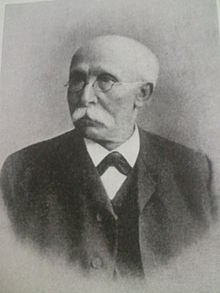Franz Strauss
| Franz Strauss | |
|---|---|
 |
|
| Born |
Franz Joseph Strauss February 26, 1822 Parkstein, Kingdom of Bavaria, German Confederation |
| Died | May 31, 1905 (aged 83) Munich, German Empire |
| Occupation | Horn player and composer |
| Spouse(s) | Elise Seiff (1851–1854) Joséphine Pschorr (1863–death) |
| Children | 4; including Richard Strauss |
Franz Joseph Strauss (26 February 1822 – 31 May 1905) was a German musician. He was a composer, a virtuoso horn player and accomplished performer on the guitar, clarinet and viola. He was principal horn player of the Bavarian Court Opera for more than 40 years, a teacher at the Royal School of Music, Munich, and a conductor.
Strauss is perhaps best known as the father of the composer Richard Strauss, on whose early musical development he was a great influence, steering his son to the classical and away from modern styles. As a composer, Strauss senior is remembered for his works for the horn. They include two concertos and numerous smaller works.
Strauss was born in Parkstein, Bavaria. His father, Johann Urban Strauss, was of unsteady character; his children were illegitimate and he left their upbringing to their mother, Maria Anna Kunigunde Walter. She was a member of a large and musical family, and her brother (Johann) Georg Walter undertook the boy's musical education. Georg taught Strauss to play the clarinet, guitar and a range of brass instruments. At the age of nine, Strauss was taken on as a pupil and player by another uncle, Franz Michael Walter, a military bandmaster. Georg's son Benno Walter was later to become the first violin teacher of Franz's son Richard and dedicatee of some of his works.
At the age of 15, through the influence of George Walter, Strauss was appointed to the private orchestra of Duke Max in Munich, where he remained for ten years. He gradually found that of all the instruments he could play, the horn suited him best. He started to compose for that instrument. Among his earliest compositions were a Romance, Les Adieux, and a Fantasy on Schubert's Sehnsuchtswalzer, both for horn and orchestra with alternative versions for horn and piano.
...
Wikipedia
